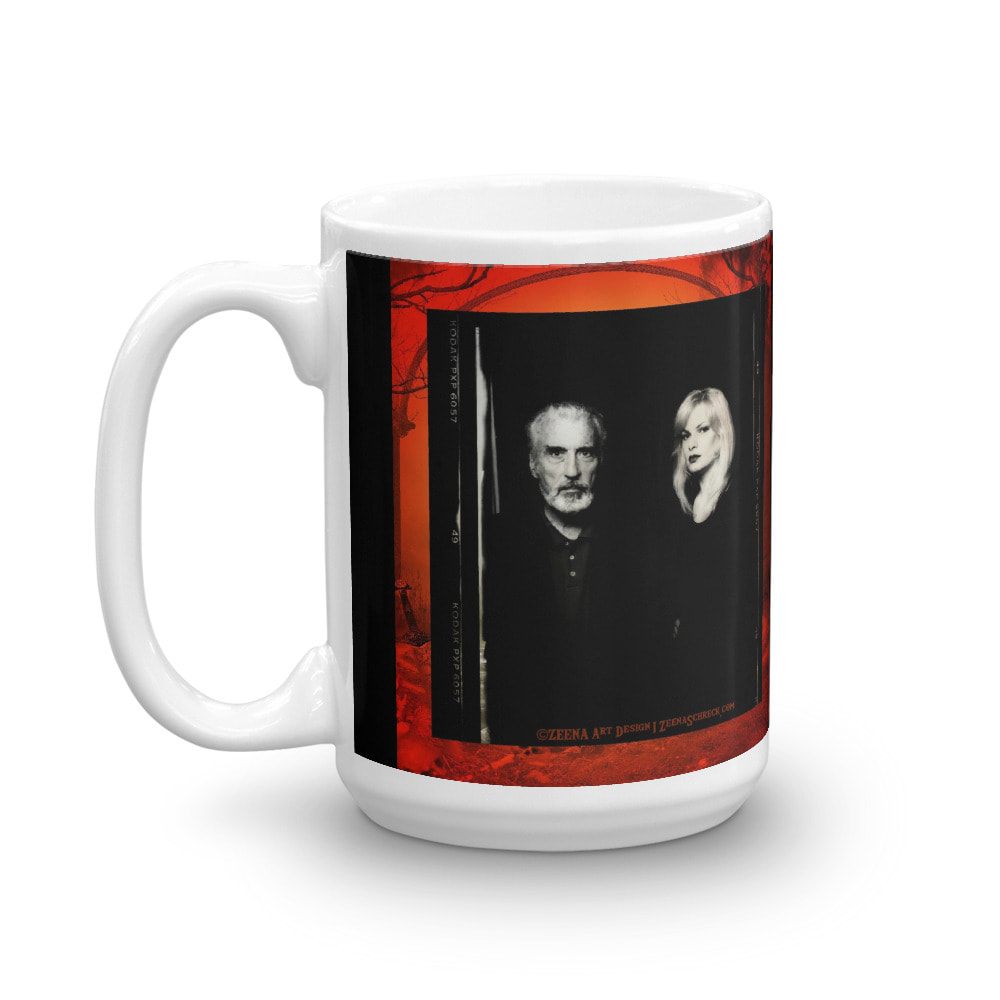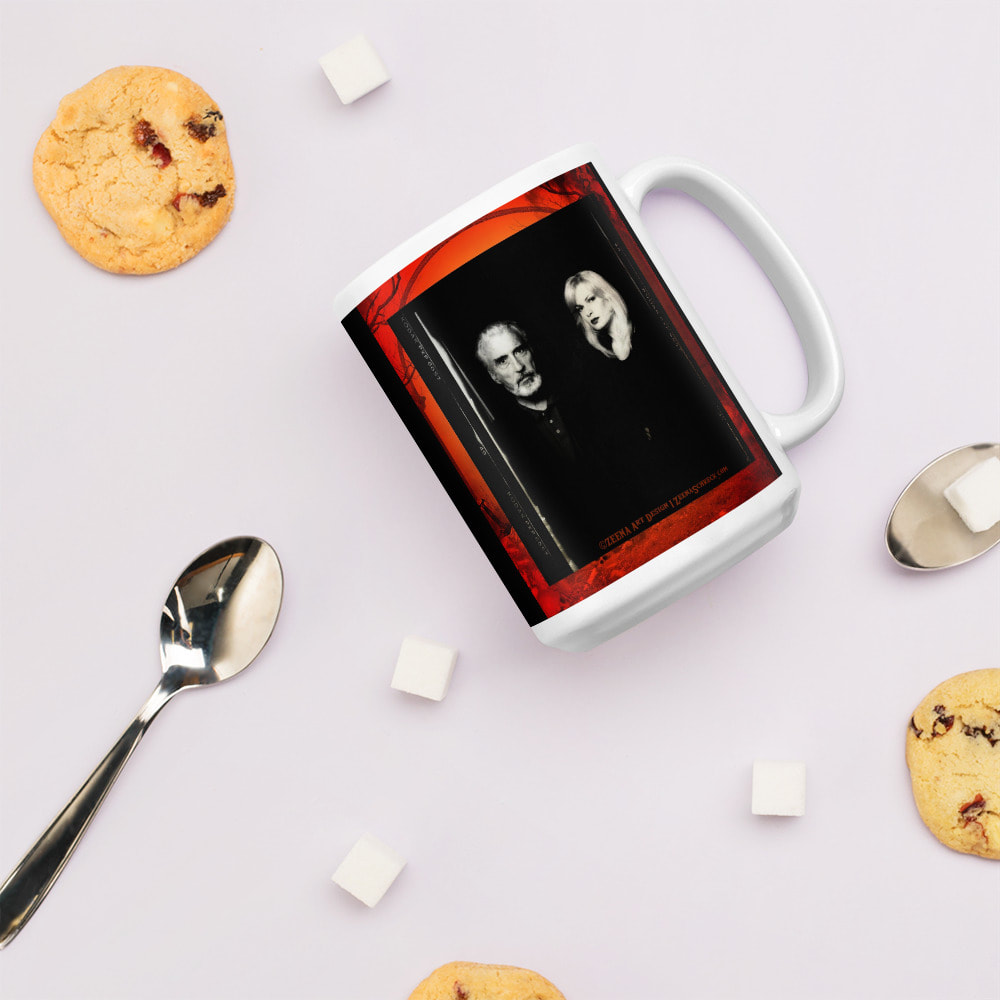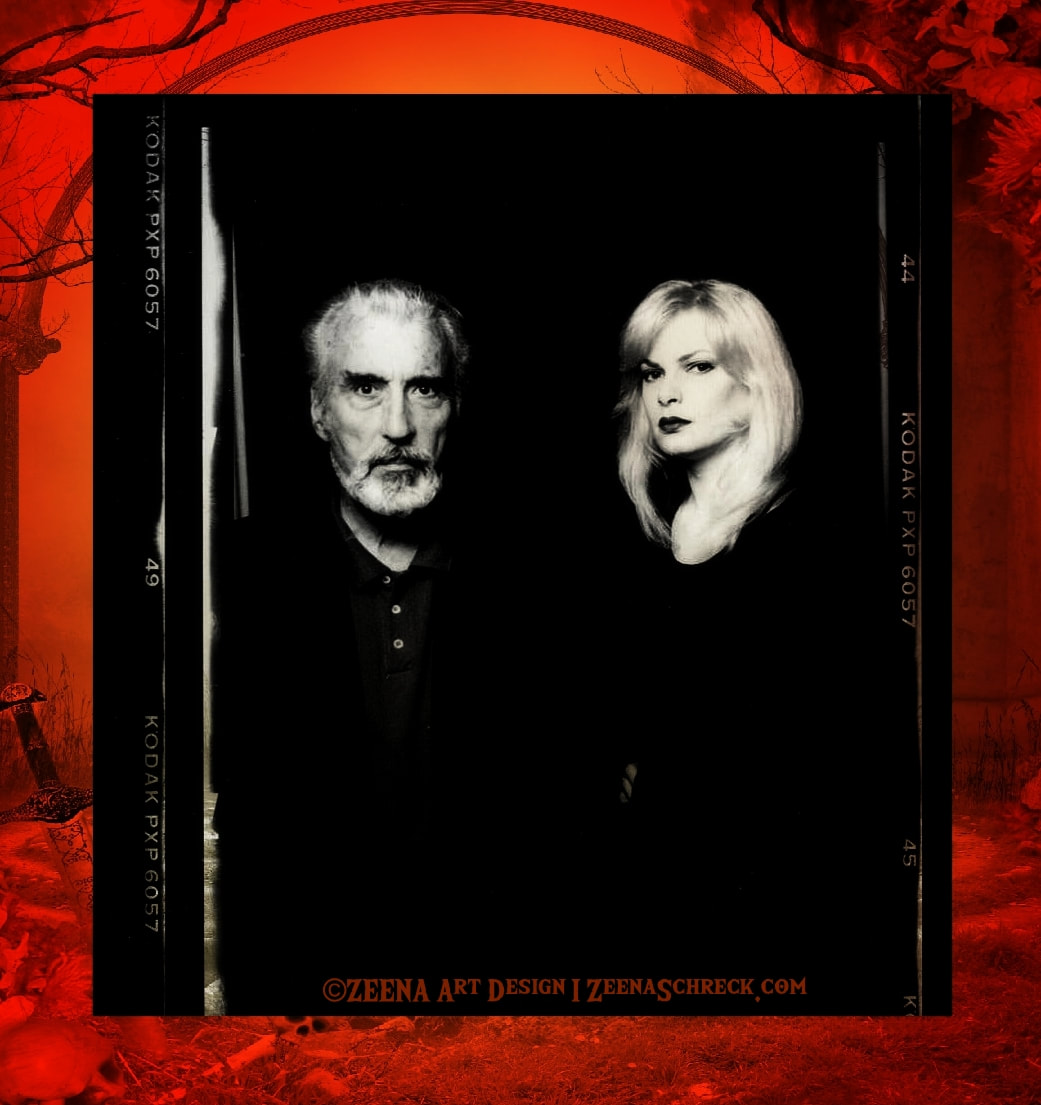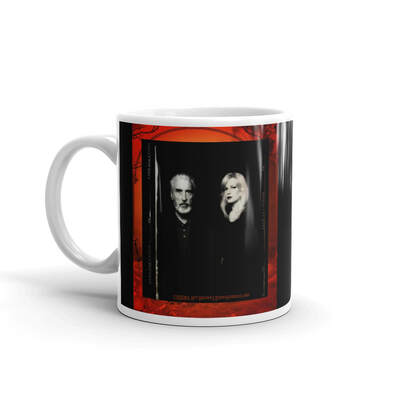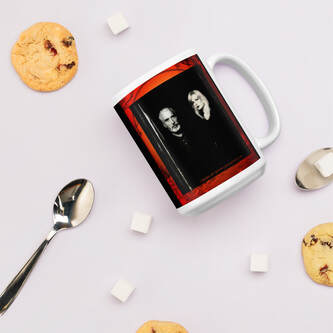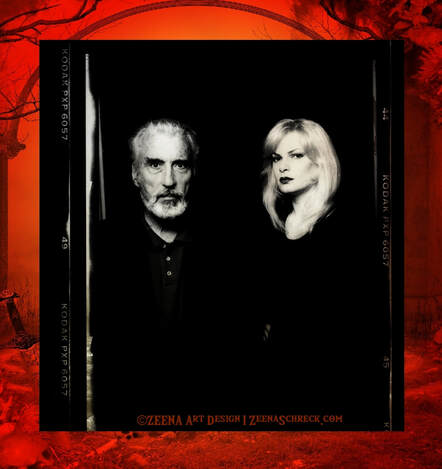 Tony Sokol at The Chiseler Online Magazine interviews Zeena about her memories of actor Christopher Lee: [Begin excerpt] The interdisciplinary avant garde artist spoke exclusively with the Chiseler about the legendary actor. Zeena “met Christopher Lee as a result of being co-producer for the CD ‘Christopher Lee Sings Devils Rogues and other Villians.’ Specifically, I first met him at the apartment in Los Angeles that [former husband] Nikolas and I rented for him and his wife Gitte to stay in while we worked on the recording of ‘Christopher Lee Sings Devils Rogues and other Villains.’ ” Long before Lee recorded with the symphonic power metal group Rhapsody of Fire, he was involved with “Christopher Lee Sings Devils, Rogues & Other Villains (From Broadway To Bayreuth And Beyond).“ “Nikolas knew of Lee’s love of classical music, opera and Broadway musicals. But at that time, the general public only knew Lee for his vampire roles and had little awareness of his musical talent and appreciation,” Zeena explained. Lee maintained that his one regret was his decision not to become an opera singer. “Nikolas conceived of the idea to spotlight Christopher Lee’s considerable singing talents,” Zeena said. “But he knew that to do that effectively, such a project would need to focus on musical selections one would automatically think of Lee singing, appropriately sinister villainous characters from Opera and musicals. “Lee was very enthusiastic at the proposal. So it was through helping Nikolas with the planning, production and coordinating of that project that I got to know Christopher. We recorded it at a studio in Crossroads of the World in Los Angeles. A considerable amount of work and expense went into finding suitable, classically trained musicians and a musical director (Dean Shepherd, who was fantastic) who had the right skills and temperament to work well with Lee.” The friendship endured long after the work was completed. “We stayed in contact throughout the years following that album,” she said. “We’d see him whenever he was in Berlin for the Berlin Film Festival and the ‘Cinema for Peace’ benefit.” [...] “It goes without saying that Christopher was a very colorful person,” Zeena said. “But for me, the most interesting conversations with him revolved around his descriptions of his WWII work as a British Intelligence officer. He talked about parachuting into German enemy Waffen SS camps and, well, he did what the British government trained him to do, which was not pretty.” “I got the impression he was still rather haunted, even decades later, by some of his experiences during the war. Even though he believed that what he did was for virtuous and just reasons,” she added. [...] “He definitely had an interest in magic beyond the roles he played,” Zeena said. “But we need to make a distinction between 'interest’ and 'involvement.’ He had no first-hand involvement in any magical, occult or satanic groups and even declined direct invitations from such groups. “He liked horror fiction of authors like H.P. Lovecraft, Bram Stoker, Algernon Blackwood, etc. But that was purely a literary appreciation. He also had an interest in John Dee, The Golden Dawn and other 19th and early 20th century magical groups,” she explained. “However, it should be stated that Lee had an interest in a wide variety of eclectic subjects, which had nothing to do with occultism. He was simply very well-read and inquisitive by nature,” she added. Lee was in the enviable position to be able to satisfy his many curiosities. “As a result of his years in British intelligence, he’d known figures like Dennis Wheatley, his cousin Ian Fleming, etc., and had heard of their experiences with Aleister Crowley. In fact he was lifelong friends with Dennis Wheatley and agreed with Wheatley’s views on the occult. But their friendship grew out of their mutual intelligence work, not because of occult or magical interests. Christopher Lee was instrumental in getting Wheatley works to film. Wheatley’s The Forbidden Territory was made into a movie starring Ronald Squire as Sir Charles rather than Duke de Richleau in 1934. “It was Lee who convinced Hammer films to buy the rights to Wheatley’s books for the films he would star in,” Zeena said. “But it should be clarified that Lee was very dismissive and wary of occultists, black magicians or satanists.” During Zeena’s involvement in the Lee album, she had the opportunity to ask Lee about the rumor that her father knew Christopher Lee. “When Nikolas and I got to know Lee, we were able to discuss this rumor with him in detail,” Zeena said. “Both Lee and his wife Gitte refuted the rumor vehemently. Lee explained that, as a result of working on the U.S. TV movie Poor Devil, with Sammy Davis, Jr. (who became a Priest in the Church of Satan), Davis tried to ingratiate Lee into accepting an invitation at the behest of my father, offering Lee a copy of The Satanic Bible, personally inscribed and signed by my father. “Lee still had the book in his collection and, on one of Nikolas’s visits to London for preparations of the CD, Lee showed Nikolas the book referring to it as a cheap paperback from the '60s witchcraft fads. Lee didn’t take it at all seriously,” Zeena said. “His wife Gitte recalled another time they visited Sammy and his wife Altovise in Los Angeles, when again Sammy tried to serve as middle-man between Dracula and the Black Pope, and again to no avail. “Lee had no interest. He said Sammy was nuts about my father but Lee saw my father as a 'Johnny-come-lately opportunist and con-man’ within the occult. Lee expressed that he had no intention of ever meeting LaVey. Then, Lee pointedly looked me in the eye and said 'I’m very glad that you had the sense to get out of all of that destructive rubbish,' expounding on what he called 'the ruinous effects of that type of belief system.' ” she concluded. The levelheaded enchantress also got to see the work that went into his actor’s preparation. “Lee took personal responsibility to research his roles, to learn what he could about the characters and the historical context, in order to bring a more believable performance to each character,” Zeena said. “His interest in devilish and monstrous roles was purely a matter of aesthetics and literary appreciation - but not at all a personal lifestyle. “I think he considered the villainous roles he played as having allegorical and moral significance. Sort of like morality tales for a new generation. I don’t think he expected to actually inspire people to want to become the characters he played. He was part Italian and had a very strong sense of religious moral ethics. So even though he befriended Wheatley and personally researched the villainous roles he would play, it was really out of a dedication to portray those roles in as real a way as possible, to understand those characters from their own points of view and to make them believable,” she said. [End of excerpts]* *THERE'S EVEN MORE TO THIS ARTICLE - READ THE FULL INTERVIEW HERE Originally posted to Chiseler on June 9, 2015
2 Comments
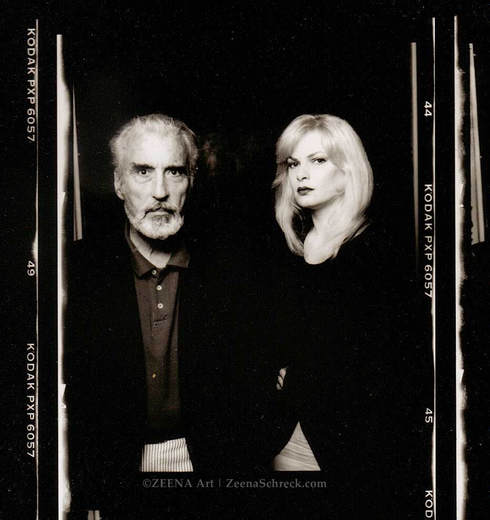 The Chiseler Online Magazine interviewed Zeena about her memories of actor Christopher Lee: The interdisciplinary avant garde artist spoke exclusively with the Chiseler about the legendary actor. Zeena “met Christopher Lee as a result of being co-producer for the CD ‘Christopher Lee Sings Devils Rogues and other Villians.’ Specifically, I first met him at the apartment in Los Angeles that Nikolas and I rented for him and his wife Gitte to stay in while we worked on the recording of ‘Christopher Lee Sings Devils Rogues and other Villains.’ ” Long before Lee recorded with the symphonic power metal group Rhapsody of Fire, he was involved with “Christopher Lee Sings Devils, Rogues & Other Villains (From Broadway To Bayreuth And Beyond).“ “Nikolas knew of Lee’s love of classical music, opera and Broadway musicals. But at that time, the general public only knew Lee for his vampire roles and had little awareness of his musical talent and appreciation,” Zeena explained. Lee maintained that his one regret was his decision not to become an opera singer. “Nikolas conceived of the idea to spotlight Christopher Lee’s considerable singing talents,” Zeena said. “But he knew that to do that effectively, such a project would need to focus on musical selections one would automatically think of Lee singing, appropriately sinister villainous characters from Opera and musicals. “Lee was very enthusiastic at the proposal. So it was through helping Nikolas with the planning, production and coordinating of that project that I got to know Christopher. We recorded it at a studio in Crossroads of the World in Los Angeles. A considerable amount of work and expense went into finding suitable, classically trained musicians and a musical director (Dean Shepherd, who was fantastic) who had the right skills and temperament to work well with Lee.” The friendship endured long after the work was completed. “We stayed in contact throughout the years following that album,” she said. “We’d see him whenever he was in Berlin for the Berlin Film Festival and the ‘Cinema for Peace’ benefit.” [...] “It goes without saying that Christopher was a very colorful person,” Zeena said. “But for me, the most interesting conversations with him revolved around his descriptions of his WWII work as a British Intelligence officer. He talked about parachuting into German enemy Waffen SS camps and, well, he did what the British government trained him to do, which was not pretty.” “I got the impression he was still rather haunted, even decades later, by some of his experiences during the war. Even though he believed that what he did was for virtuous and just reasons,” she added. [...] “He definitely had an interest in magic beyond the roles he played,” Zeena said. “But we need to make a distinction between 'interest’ and 'involvement.’ He had no first-hand involvement in any magical, occult or satanic groups and even declined direct invitations from such groups. “He liked horror fiction of authors like H.P. Lovecraft, Bram Stoker, Algernon Blackwood, etc. But that was purely a literary appreciation. He also had an interest in John Dee, The Golden Dawn and other 19th and early 20th century magical groups,” she explained. “However, it should be stated that Lee had an interest in a wide variety of eclectic subjects, which had nothing to do with occultism. He was simply very well-read and inquisitive by nature,” she added. Lee was in the enviable position to be able to satisfy his many curiosities. “As a result of his years in British intelligence, he’d known figures like Dennis Wheatley, his cousin Ian Fleming, etc., and had heard of their experiences with Aleister Crowley. In fact he was lifelong friends with Dennis Wheatley and agreed with Wheatley’s views on the occult. But their friendship grew out of their mutual intelligence work, not because of occult or magical interests. Christopher Lee was instrumental in getting Wheatley works to film. Wheatley’s The Forbidden Territory was made into a movie starring Ronald Squire as Sir Charles rather than Duke de Richleau in 1934. “It was Lee who convinced Hammer films to buy the rights to Wheatley’s books for the films he would star in,” Zeena said. “But it should be clarified that Lee was very dismissive and wary of occultists, black magicians or satanists.” During Zeena’s involvement in the Lee album, she had the opportunity to ask Lee about the rumor that her father knew Christopher Lee. “When Nikolas and I got to know Lee, we were able to discuss this rumor with him in detail,” Zeena said. “Both Lee and his wife Gitte refuted the rumor vehemently. Lee explained that, as a result of working on the U.S. TV movie Poor Devil, with Sammy Davis, Jr. (who became a Priest in the Church of Satan), Davis tried to ingratiate Lee into accepting an invitation at the behest of my father, offering Lee a copy of The Satanic Bible, personally inscribed and signed by my father. “Lee still had the book in his collection and, on one of Nikolas’s visits to London for preparations of the CD, Lee showed Nikolas the book referring to it as a cheap paperback from the '60s witchcraft fads. Lee didn’t take it at all seriously,” Zeena said. “His wife Gitte recalled another time they visited Sammy and his wife Altovise in Los Angeles, when again Sammy tried to serve as middle-man between Dracula and the Black Pope, and again to no avail. “Lee had no interest. He said Sammy was nuts about my father but Lee saw my father as a 'Johnny-come-lately opportunist and con-man’ within the occult. Lee expressed that he had no intention of ever meeting LaVey. Then, Lee pointedly looked me in the eye and said 'I’m very glad that you had the sense to get out of all of that destructive rubbish, expounding on what he called the ruinous effects of that type of belief system,’ ” she concluded. The levelheaded enchantress also got to see the work that went into his actor’s preparation. “Lee took personal responsibility to research his roles, to learn what he could about the characters and the historical context, in order to bring a more believable performance to each character,” Zeena said. “His interest in devilish and monstrous roles was purely a matter of aesthetics and literary appreciation - but not at all a personal lifestyle. “I think he considered the villainous roles he played as having allegorical and moral significance. Sort of like morality tales for a new generation. I don’t think he expected to actually inspire people to want to become the characters he played. He was part Italian and had a very strong sense of religious moral ethics. So even though he befriended Wheatley and personally researched the villainous roles he would play, it was really out of a dedication to portray those roles in as real a way as possible, to understand those characters from their own points of view and to make them believable,” she said. THERE'S MORE TO THE ARTICLE - READ THE FULL INTERVIEW HERE 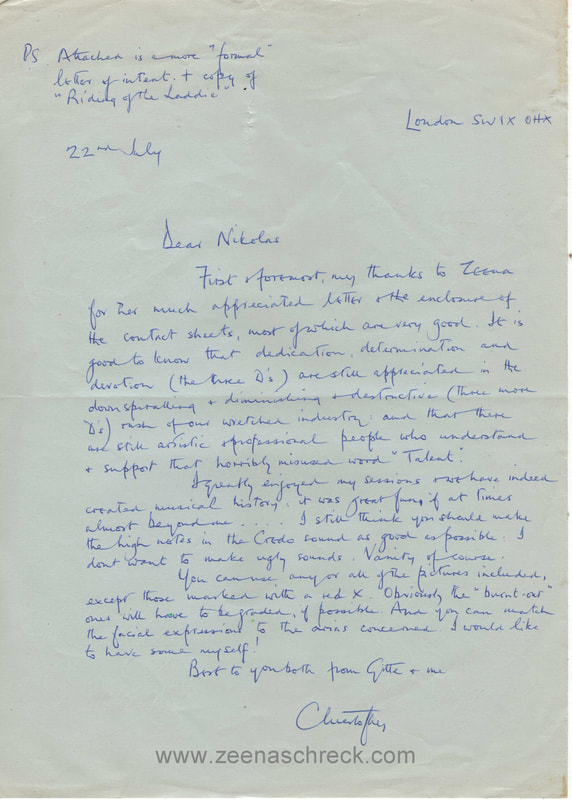 Christopher Lee letter from 22nd of July [1996] "Dear Nikolas, First & foremost, my thanks to Zeena for her much appreciated letter & the enclosure of the contact sheets [photos for the CD], most of which are very good. It is good to know that dedication, determination and devotion (the three D's) are still appreciated in the downspiralling & diminishing & destructive (thee more D's) rush of our wretched industry; and that there are still artistic & professional people who understand & support that horribly misused word “Talent.” I greatly enjoyed my sessions & we have indeed created musical history, it was great fun, if at times almost beyond me....I still think you should make the high notes in the Credo sound as good as possible. I don't want to make ugly sounds. Vanity of course. You can use any or all of the pictures included, except those marked with a red X. Obviously the “burnt out” ones will need to be graded, if possible. And you can match the facial expressions to the arias concerned. I would like to have some myself! Best to you both from Gitta & me, Christopher" |
SUPPORT FOR WORKS IN PROGRESS
Zeena is an entirely independent, self-funded artist. Her livelihood and funding for creative projects rely solely on commissioned artwork, teaching and lecturing engagements, performances and purchases of her products and music, as well as from donations from private patrons and sponsors. If you would like to pledge your support towards the production costs of current works in progress, please use the PayPal donation button at the top of page. Thank you for your support of Zeena's work! Archives
May 2024
Categories
All
|
Zeena's Bandcamp page |
Copyright ©2024 Zeena Schreck. All rights reserved.
|

